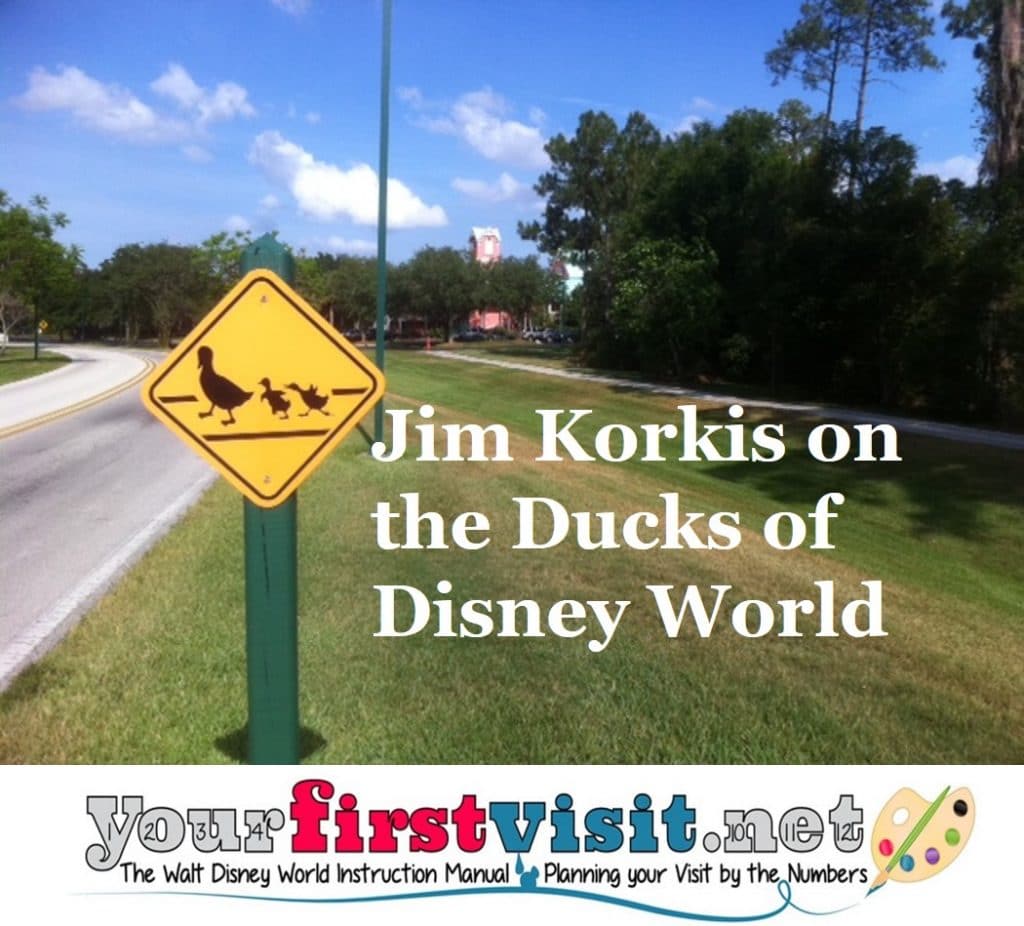A Friday Visit with Jim Korkis: The Ducks of Disney World
By Dave Shute
Welcome back to Fridays with Jim Korkis! Jim, the dean of Disney historians, writes about Walt Disney World history every Friday on yourfirstvisit.net.
THE DUCKS OF DISNEY WORLD
By Jim Korkis
Donald Duck is not the only duck that delights visitors to Walt Disney World. Since its opening in 1971, guests have been enthralled by the many wild ducks that inhabit the waterways of the park and who are bold enough to waddle down the walkways with baby ducklings following obediently after their mothers.
These fowl fellows are so popular that there is even an Instagram account devoted to them so that guests can document their appearances in different locations in the parks. The ducks sometimes patiently pose in hopes that their patience will be rewarded with an edible treat.

According to the cast magazine Backstage Disneyland Summer 1966, “Shortly after the Rivers of America area of Frontierland was completed, wild ducks flocked in to make it their home. These ducks soon came to be a big part of the show. One day, the duck population started to thin out dramatically and it wasn’t long before a memo appeared dated sometime in 1956.
“It was directed to all maintenance and construction workers and read: ‘Any employee caught leaving Disneyland with a duck in his lunch pail will be immediately dismissed’. Needless to say, the duck population was soon on the increase again.”
The opening of Walt Disney World in 1971 proved to be even a more enticing location for migrating flocks and every spring, the air is filled with the quacking sounds of newborn ducklings.
With a fearlessness not found in the wild, these offspring, accompanying their parents, wander the park especially through the chairs and tables of the outdoor food areas in hopes of scavenging a special treat of popcorn.
Some guests specifically buy a bag of popcorn to feed to the ducks and the ducks know it and will waddle up dangerously close while quacking away in hopes of getting a handout.
However, life is dangerous for these feathered friends. Feral cats patrol the park at night looking for baby duck or duck eggs. In addition, local alligators find them a tasty and easily obtainable snack as well. Often, bigger birds like herons or hawks will sit patiently and then swoop down to grab a baby duckling that has strayed a little bit too far from its flock either for itself or to feed its offspring.
Disney does try to discourage guests from feeding the wild animals including not just ducks but squirrels, rabbits and other wildlife that are not an official part of the park population. As an accredited member of the AZA, Disney realizes that some foods are not always good for these creatures and can actually cause digestive problems or disease that can prove fatal.
Even the guests themselves can pose a threat as they gather too closely around the baby ducklings and can trample them which is why cast members often try to wrangle the ducks off of congested walkways or accompany them back to the water.
However, since the ducks eat free at Walt Disney World, are surrounded by so many others of their kind and enjoy the many advantages that Disney takes with keeping the water clean, it seems that the perks far outweigh the disadvantages and that it is a bit safer than some of the other environments they might visit.
* * * * *
Thanks, Jim! And come back next Friday for more from Jim Korkis!
In the meantime, check out his books, including his latest, Call Me Walt, and his Secret Stories of Walt Disney World: Things You Never You Never Knew, which reprints much material first written for this site, all published by Theme Park Press.
Follow yourfirstvisit.net on Facebook or Twitter or Pinterest!!





0 comments
Comment by typing in the form below.
Leave a Comment | Ask a Question | Note a Problem